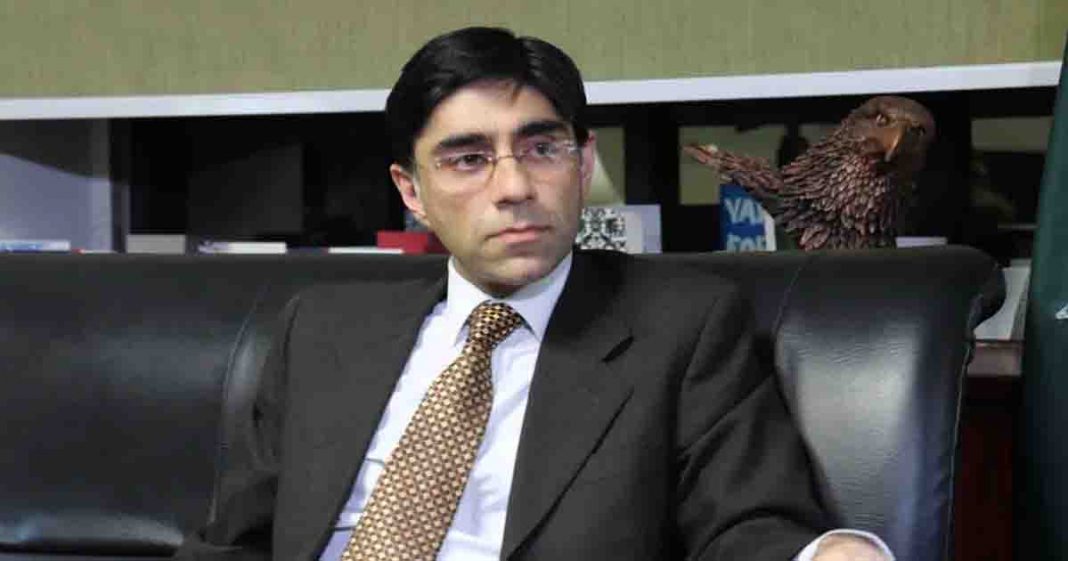National Security Advisor (NSA) Moeed Yusuf left for the United States on an official visit on Monday to be part of a high-level bilateral engagement.
These engagements were agreed upon between him and his American counterpart, Jake Sullivan, during their first meeting in Geneva in May.
During the visit, NSA will be meeting Jake Sullivan and other senior US officials.
A statement released by the PM office revealed that Dr. Yusuf will also hold meetings with other US legislators, the Pakistani community in the US, think tanks, and others.
US-Pakistan relationships have been on the back burner since Pakistan has become a big stakeholder in China’s OBOR initiative, by means of the latter’s investment in the infrastructure and energy projects in the country.
Read more: Is Moeed Yusuf going to meet Indian NSA in SCO’s meeting?
The US’s callousness was revealed recently when in an interview with an American media outlet, Prime Minister of Pakistan Imran Khan revealed that US president Joe Biden hasn’t contacted him since the latter came to power.
“Whenever he has time he can speak to me. At the moment, clearly, he has other priorities,” he had told Axios anchor Jonathan Swan.
Pakistani government’s coldness to this fact was revealed when Dr. Yusuf on a private TV show said if US President Joe Biden did not want to talk to Pakistan, then “good luck” as Pakistan was not waiting for him to call either.
According to Dawn, NSA Moeed Yusuf had complained to his US counterpart about the Biden administration giving Pakistan the cold shoulder, while Sullivan attributed this a lack of engagement between the two countries to the Covid-19 pandemic and a greater focus on internal issues.
Yusuf had also complained of a lack of coordination among the Pakistani and US officials on Afghanistan, saying we came to know about the withdrawal of foreign troops from the media.
“We don’t want anyone to insult the US but if the finger is pointed at Pakistan, then it will be responded to,” he had said.
Read more: NSA Moeed Yusuf’s interview is a reflection of ‘Naya Pakistan’
Today, I was interviewed by Indian anchor Karan Thapar for the second time where I candidly explained Pakistan’s position on India and Afghanistan.
Link: https://t.co/CkcwLTmLsi pic.twitter.com/wqZAQpm5Nm— Moeed W. Yusuf (@YusufMoeed) July 24, 2021
How events unfolded
In April 2021, the Biden administration announced that the US troops would be withdrawing from Afghanistan.
US government claimed that the American National Security team has been in contact with the regional allies in hopes for intelligence information and counterterrorism strikes in case Afghanistan becomes the victim of another civil war after the NATO troops pull out.
In May, US Assistant Secretary of Defence for Indo-Pacific Affairs David F. Helvey had told the Senate Armed Services Committee that “Pakistan has allowed us to have overflight and access to be able to support our military presence in Afghanistan”.
Read more: US desperation for military bases: Pakistan’s opportunity?
However, the Foreign Minister of Pakistan Shah Mahmood Qureshi had openly declared on the Parliament floor that no military base will be handed over for foreign interests as long as Prime Minister Imran Khan is in power.
“Absolutely not. There is no way we are going to allow any bases, any sort of action from Pakistani territory into Afghanistan. Absolutely not,” the prime minister had said during an interview given to HBO.
Later, on 30th June as he made the budget speech, PM Khan said that Pakistan’s biggest mistake was becoming the frontier state for the US’s war that resulted in the loss of 70,000 precious Pakistani lives.
He further added that a friendly nation, unlike the US, would never bomb its own friend and hence Pakistan would never again compromise its sovereignty for another country.
Then, in a recent interview with China’s state broadcaster named China Global Television Network, PM Khan said, “Whatever will happen, our relationship between the two countries, no matter what pressure is put on us, is not going to change.”
Read more: China Pakistan Free Trade Agreement Opening bigger and brighter opportunities
However, the strategic importance of good relations with the US can’t be underestimated, especially as the situation in Pakistan’s Western neighbor deteriorates.
Thus, this visit will mark a significant development in the relationships between Pakistan and the US.














